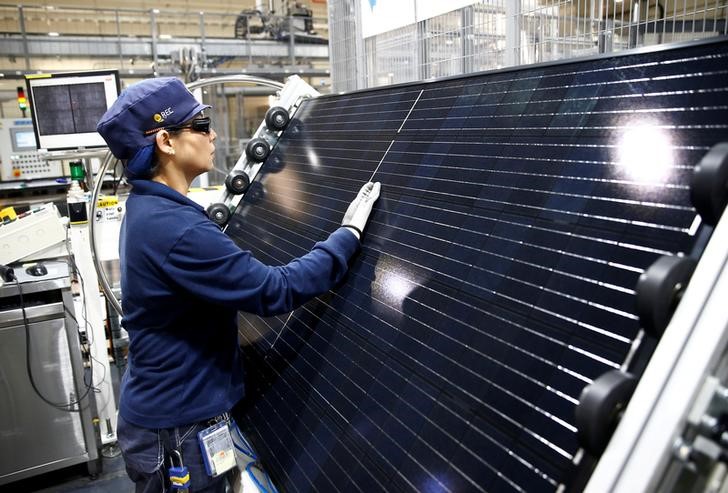
FILE PHOTO: An employee makes a final inspection on panels during a tour of an REC solar panel manufacturing plant in Singapore, May 5, 2017. REUTERS/Edgar Su/File Photo
October 20, 2017
By Florence Tan
SINGAPORE (Reuters) – Solar panel maker REC Group expects to be exempted from restrictions likely to be imposed on panel imports into the United States following a recent U.S. trade ruling, its chief executive said.
REC, based in Singapore, is waiting to hear in the next few weeks what measures the Trump administration will take to limit imports after the U.S. International Trade Commission ruled that U.S. panel makers have been harmed by cheap imports.
The commission said Singapore would be excluded from any restrictions as it has a free trade agreement with the United States, REC Chief Executive Steve O’Neil said.
“So we don’t expect anything to affect us,” O’Neil told Reuters in an interview. “But we won’t know until the Trump administration makes their ruling.”
“We’re certainly paying a lot of attention to it. We’re small enough that we can be very nimble,” O’Neil said.
REC, founded in Norway but headquartered in Singapore, is today majority owned by China National Chemical Corp (ChemChina) [CNNCC.UL]. The company has production capacity of 1.5 gigawatts (GW) and sells about half of its panels to the United States, 30 percent to Europe and the rest in Asia.
More than 90 percent of the world’s solar panel-making capacity is in Asia, with China accounting for 70 percent of the output followed by southeast Asia, O’Neil said.
High costs, the lack of raw materials and infrastructure make it hard for U.S. solar panel producers to compete with those in Asia.
“There are still hundreds of solar companies and the largest solar company at our end has about an 8 percent market share,” O’Neil said.
“We know consolidation is coming and maturing will happen, but right now, it’s still a race for scale, for technology, and to emerge as a winner in the solar-panel manufacturing end of the market.”
Rooftop solar is growing rapidly thanks to a near 30 percent drop in the cost of solar panels since 2016 and government policies that allow consumers to sell their excess solar power into the grid.
“This year we’ve tripled our sales in Australia in 2017,” O’Neil said.
The world is expected to add up to 100 GW of solar power capacity this year that will bring the cumulative installed capacity to 300-350 GW, O’Neil said.
Besides the United States, REC sees India, Europe and Southeast Asia as growing markets to tap, he said.
(Reporting by Florence Tan; Editing by Sonali Paul)
